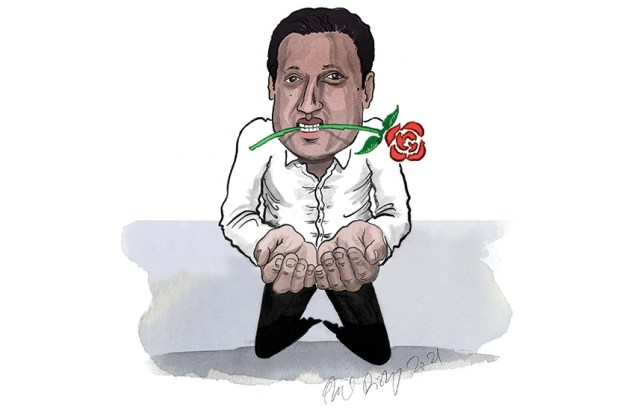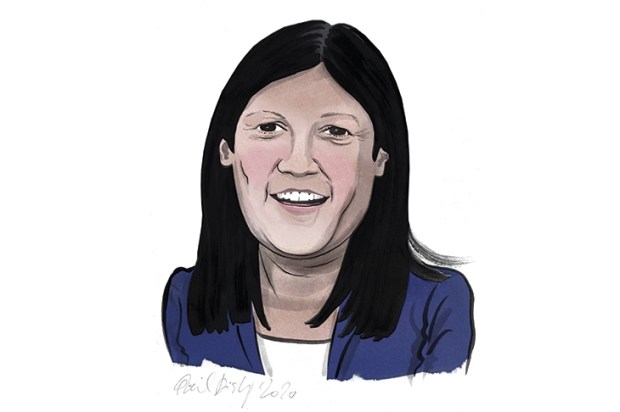Shortly before the last election a group of Labour MPs approached Ed Miliband to ask him what he would do if he lost. They suggested he could provide stability by staying on as leader for a while, as Michael Howard had done, and that his last duty should be to oversee an inquiry into what went wrong at the general election. Miliband, still convinced he would win, did not entertain the idea, to the dismay of his policy chief, Jon Cruddas. After the election, Cruddas decided to go ahead and do an inquiry anyway.
The results will infuriate the Labour left. The inquiry found that Labour’s anti-austerity message put voters off. The inquiry divided Labour’s supporters into three groups: Jeremy Corbyn’s tribe of affluent, socially liberal, metropolitan ‘pioneers’; the less starry-eyed pragmatic ‘prospectors’; and socially conservative ‘settlers’ concerned with home, family and national security. As recently as last November, it found, Labour’s support covered all three. By the election only the diehard ‘pioneers’ still had warm feelings.
It’s a bleak picture. But when I meet Cruddas, he seems excited by what’s going on. ‘Something quite extraordinary has developed through the summer and a lot of it I find really quite positive,’ he says. Corbynmania even swept his own family: his mother, two of his brothers and sisters and his son joined Labour. ‘None of them joined when I stood for elected representation!’ he says.
Cruddas seems unfazed by the apparent crisis within the party. ‘Would it have been better to have a very quiet summer, and possibly a boring leadership election, with all these issues left to fester?’ he asks. ‘Perhaps what was needed was to actually tip the whole thing over.’
‘This process will force people into thinking: hang on a second, where is this party going, what are we going to do about it?’ The last time that happened, he says, was 20 years ago, when Tony Blair became leader. ‘In 1994–97 there was an ideological renewal of the party which was about the aims and values of the party.’ This led to the ‘political strategy and the development of New Labour’. So the scene is now set for ‘an equivalent renewal across the organisation, the ideology and the political strategy of the party’.
The destruction of the Labour sandcastle is good because it provides an opportunity to build something more substantial. ‘Cumulatively, I’m not unhappy about what’s happening,’ he says. ‘But it is a high-wire act.’ Given the chasm between what his inquiry found and what Corbyn and his shadow chancellor John McDonnell want to do, isn’t he worried that Labour might fall off the high wire?
Cruddas says Labour’s new leader has a vision: that the party has been ‘austerity-lite’ and failed to confront ‘neoliberalism’. ‘There is a coherence to that argument,’ he says, ‘but I don’t see how that is reconciled with the data. We find — however uncomfortable this is to swallow — the evidence suggests that actually we weren’t supported because we were seen as anti-austerity.’
What about Corbyn’s argument that the public is concerned about the deficit because no one has bothered to persuade them about the dangers of austerity? ‘That might be right,’ Cruddas says, slowly. ‘I don’t know.’ But he worries the party is talking too much to itself and not enough to voters, and that emotion may be supplanting reason.
‘Orwell always used to talk historically about the self-righteousness of the metropolitan left. You can see a bit of that coming back into play in terms of its absolutism, its purity. The danger is a chasm emerging between the membership and the tempo of the country.’ Labour needs to operate ‘on the basis of where the country is and try and contest that rather than assume [voters] are elsewhere’.
What seems to have shocked Labour MPs is they assumed the party membership was elsewhere, too, and so Corbyn could never win. Blairites are particularly bewildered. Cruddas — who nominated Corbyn but voted for Andy Burnham — has little sympathy. ‘The Blairites now can’t understand what’s going on because they are operating within a totally shrunken framework,’ he says. ‘They woke up to find a party that has totally disappeared in front of them. They don’t know what to do, and now they sound like a sect.’
Cruddas spent his summer reading Blair’s early speeches, and is struck by how different early Blairism was to what it became at the end. ‘You discover a marriage of economic and ethical Labour traditions which creates a powerful political language, and a policy agenda far richer than the collapsed project which, by the end, just fetishised some public service reforms.’ It is as if he regards Blairites as traitors to their own cause.
The collapse of Blairism created a vacuum, he says, now filled by Corbynism. ‘Labour lost that emotional power of our political project. So we became transactional, instrumentalist, remote, managerial, technocratic, blah blah blah. Then Corbyn comes in, with this ethic of principle versus power. He is allowed to put a wedge into the whole leadership thing because we’ve lost the principal ethical contribution which was, actually, the hallmark of the whole New Labour project.’
Cruddas says the new leader ‘could be’ prime minister but avoids saying whether this would be a good thing. His concern is how to rehabilitate the intellectual and political renewal he thinks that Blairism once represented. He says he is ‘not interested any more’ in serving in an official role and is instead setting up a group involving MPs and local government leaders that will use his review on why the party lost to make the case for change. ‘I don’t think this is going to be sorted out within the shadow cabinet — or the front bench in Parliament, really. It is a deeper project of renewal that’s needed which we dodged post-2010.’
‘The leadership election has shown there is a desperate need for a new platform for ideas and reform within Labour. Neither the centre right of the party or the soft left had anything meaningful to offer. This needs to be driven by ideas.’
If the party leadership refuses to do the thinking, Cruddas will do it for them. His new group might be quite useful for the next Labour leader if, as most expect, Corbyn fails. ‘I’ll be worried about where it will all end up whoever is the leader. The backdrop to this is not Corbyn triggering a crisis for the party, it’s the party facing arguably its greatest crisis in history.’
Got something to add? Join the discussion and comment below.
Get 10 issues for just $10
Subscribe to The Spectator Australia today for the next 10 magazine issues, plus full online access, for just $10.
You might disagree with half of it, but you’ll enjoy reading all of it. Try your first month for free, then just $2 a week for the remainder of your first year.














Comments
Don't miss out
Join the conversation with other Spectator Australia readers. Subscribe to leave a comment.
SUBSCRIBEAlready a subscriber? Log in